Daily Vocabulary Words: List of Daily Used Words in Leading International Newspapers
Hi there. Welcome to this special section @ Wordpandit.
Our endeavour here is very simple: to highlight important daily vocabulary words, which you would come across in leading newspapers in the country. We have included the following newspapers in our selection:
• The New York Times
• The Washington Post
• Scientific American
• BBC
• The Guardian
• Psychology Today
• Wall Street Journal
• The Economist
We are putting in extensive work for developing your vocabulary. All you have got to do is be regular with this section and check out this post on a daily basis. This is your repository of words that are commonly used and essentially, we are posting a list of daily used words. Hence, this has significant practical application as it teaches you words that are used commonly in leading publications mentioned above.
Visit the website daily to learn words from leading international newspapers.
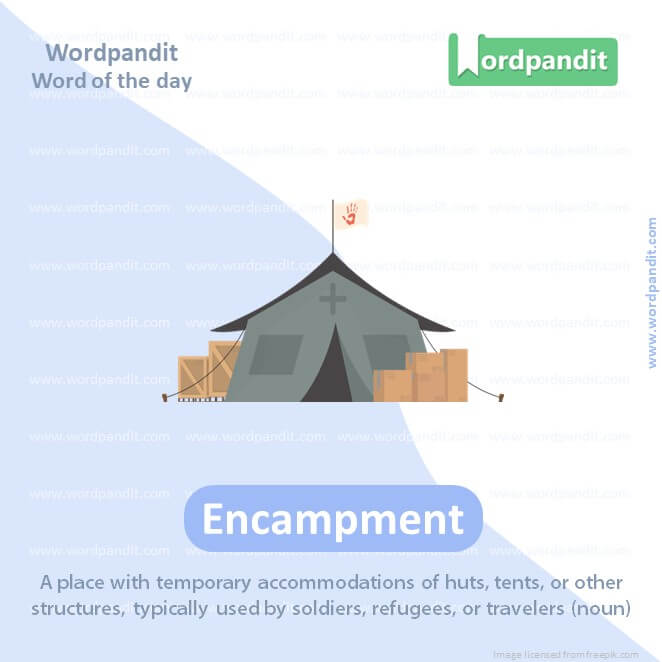
WORD-1: Encampment
CONTEXT: The unhoused draw scant attention from the city, unless a headline-grabbing incident involving an encampment comes into view.
SOURCE: Washington Post
EXPLANATORY PARAGRAPH: Imagine a group of people setting up tents and staying in one place for a while, like when you go camping. An encampment is just that – a place with tents or temporary shelters where people live for a short time.
MEANING: A place with temporary accommodations of huts, tents, or other structures, typically used by soldiers, refugees, or travelers (noun).
PRONUNCIATION: en-kamp-ment
SYNONYMS: Camp, Bivouac, Campsite, Base camp, Temporary settlement,
Outpost
USAGE EXAMPLES:
1. The soldiers set up an encampment near the river.
2. The refugee encampment was expanding rapidly.
3. They stumbled upon an ancient encampment in the forest.
4. The archaeological team established an encampment for their excavation work.
WORD-2: Destabilizing
CONTEXT: The consequences of such a move would be so dangerously destabilizing to the nation that the court will almost certainly resort to one of the many legal off-ramps that would prevent Section 3 from being deployed against Trump.
SOURCE: Washington Post
EXPLANATORY PARAGRAPH: Think about building a tower with blocks. If someone takes out one of the bottom blocks, the tower might wobble or fall. That’s like destabilizing – it means making something less stable or secure.
MEANING: Causing something to become unstable; upsetting the balance or equilibrium of something (verb).
PRONUNCIATION: dee-stay-buh-lie-zing
SYNONYMS: Disrupting, Upsetting, Unsettling, Undermining, Weakening, Disordering
USAGE EXAMPLES:
1. The sudden resignation of the CEO had a destabilizing effect on the company.
2. Political unrest is destabilizing the region.
3. Economic crises can be highly destabilizing for a country.
4. His actions were seen as destabilizing the team’s dynamics.
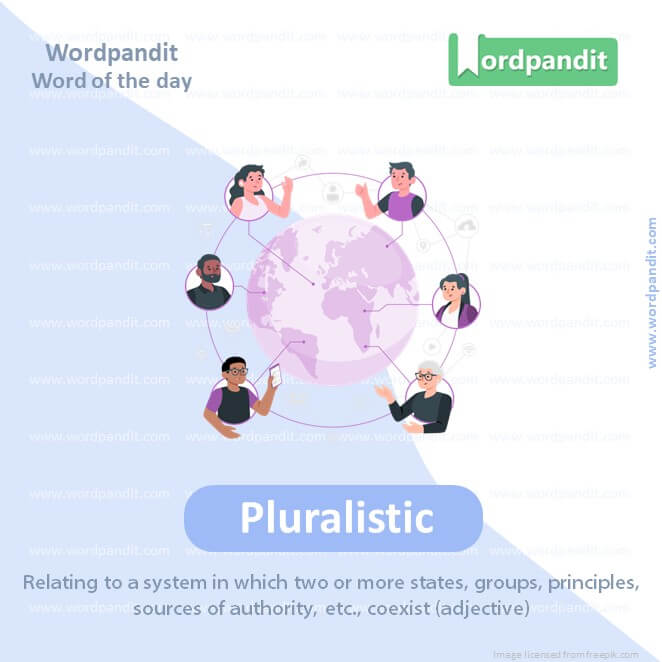
WORD-3: Pluralistic
CONTEXT: A positive-sum society is a more pluralistic and tolerant society because all its members are encouraged to pioneer their own specialty.
SOURCE: New York Times
EXPLANATORY PARAGRAPH: Imagine a party where everyone is different – some like to dance, some like to paint, and others like to sing. Pluralistic means having lots of different kinds or types, especially in terms of beliefs or ways of living.
MEANING: Relating to a system in which two or more states, groups, principles, sources of authority, etc., coexist (adjective).
PRONUNCIATION: ploo-ruh-lis-tik
SYNONYMS: Diverse, Multicultural, Varied, Mixed, Multiplicity, Manifold
USAGE EXAMPLES:
1. The country is known for its pluralistic society.
2. She wrote a paper on pluralistic approaches to education.
3. The organization promotes a pluralistic viewpoint.
4. Pluralistic cultures have diverse and inclusive values.
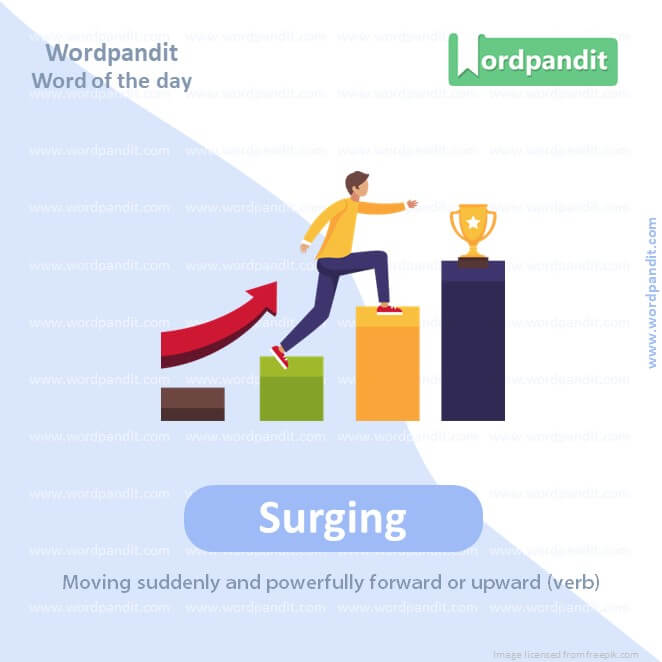
WORD-4: Surging
CONTEXT: Zero-sum thinking is surging on the left as well.
SOURCE: New York Times
EXPLANATORY PARAGRAPH: Imagine the sea during a storm, with big waves rising
and falling. Surging is like that. It means moving quickly and powerfully forward or upward, like those big waves.
MEANING: Moving suddenly and powerfully forward or upward (verb).
PRONUNCIATION: sur-jing
SYNONYMS: Rising, Swelling, Increasing, Escalating, Intensifying, Sweeping
USAGE EXAMPLES:
1. The crowd was surging forward to get a better view.
2. The river was surging after the heavy rain.
3. Demand for the product was surging.
4. The team’s confidence was surging after the victory.
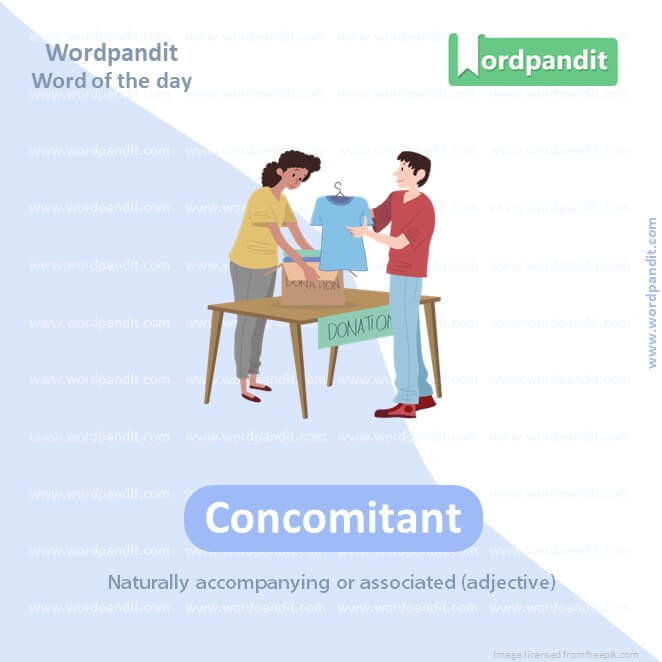
WORD-5: Concomitant
CONTEXT: This disillusion led to a concomitant rise in global populism.
SOURCE: New York Times
EXPLANATORY PARAGRAPH: Think of eating popcorn while watching a movie. The popcorn is concomitant with the movie – it happens at the same time and is connected to the movie experience.
MEANING: Naturally accompanying or associated (adjective).
PRONUNCIATION: kon-kom-i-tant
SYNONYMS: Accompanying, Associated, Coexisting, Concurrent, Synchronous, Simultaneous
USAGE EXAMPLES:
1. There are several concomitant changes happening in the industry.
2. The rise in employment saw a concomitant increase in consumer spending.
3. The drug’s benefits come with concomitant risks.
4. The social changes were concomitant with economic developments.
WORD-6: Foreboding
CONTEXT: Many of us greet 2024 with a sense of foreboding. We need Joe Biden to be as big as this year demands.
SOURCE: New York Times
EXPLANATORY PARAGRAPH: Foreboding is like when you think something bad is going to happen, even if everything seems okay. It’s a feeling that warns you that something is not right.
MEANING: A feeling that something bad will happen; fearful apprehension (noun).
PRONUNCIATION: for-bo-ding
SYNONYMS: Apprehension, Premonition, Misgiving, Dread, Unease, Presentiment
USAGE EXAMPLES:
1. She had a strong sense of foreboding about his journey.
2. The dark clouds gave a foreboding of what was to come.
3. His sudden departure left them with a feeling of foreboding.
4. The eerie silence in the house created a sense of foreboding.
WORD-7: Multifront
CONTEXT: We are in the middle of a multifront conflict that pits the forces of civilization against the forces of barbarism.
SOURCE: New York Times
EXPLANATORY PARAGRAPH: Imagine fighting a battle in several different places at the same time. That’s what “multifront” means. It’s used to describe a situation where someone is dealing with many challenges or conflicts at once.
MEANING: Involving multiple areas of conflict or struggle (adjective).
PRONUNCIATION: mul-tee-front
SYNONYMS: Multidimensional, Multi-aspect, Multi-sided, Diverse-front, Complex, Variegated
USAGE EXAMPLES:
1. The company is fighting a multifront legal battle.
2. The government’s multifront strategy to address the crisis.
3. He faced multifront challenges in his personal and professional life.
4. The multifront war was difficult to manage.
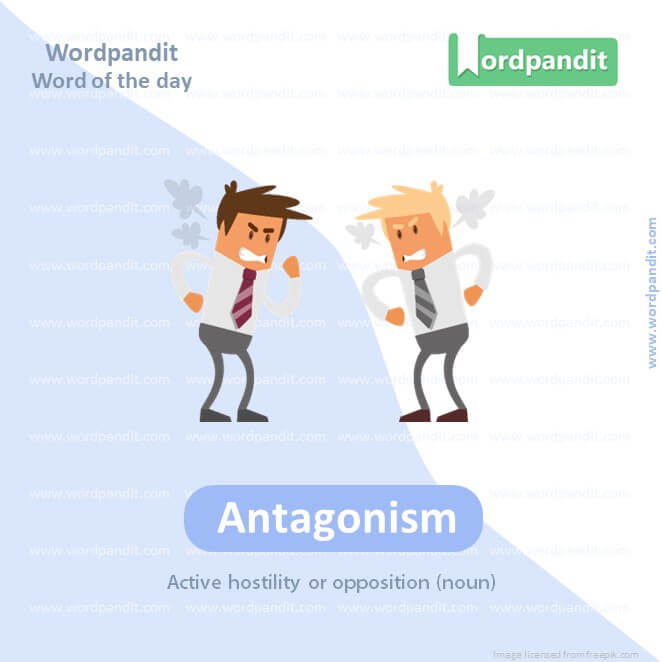
WORD-8: Antagonism
CONTEXT: In this kind of society, life is not about conquest and domination but regulated competition and voluntary exchange. Not about antagonism but interdependence.
SOURCE: New York Times
EXPLANATORY PARAGRAPH: Antagonism is when two people or groups don’t get along and are against each other, like two kids who always argue and can’t agree on anything.
MEANING: Active hostility or opposition (noun).
PRONUNCIATION: an-tag-uh-niz-um
SYNONYMS: Hostility, Opposition, Animosity, Enmity, Rivalry, Conflict
USAGE EXAMPLES:
1. There was a deep antagonism between the two leaders.
2. The antagonism between the teams was evident.
3. Her ideas met with antagonism from her colleagues.
4. The novel explores the antagonism between different social classes.
WORD-9: Plummeting
CONTEXT: the American economy is surging, with fast growth, plummeting inflation, real wage increases.
SOURCE: New York Times
EXPLANATORY PARAGRAPH: Imagine a rock falling quickly from a high cliff. That’s what “plummeting” means. It’s used when something is falling down very fast, like a rock or when numbers go down quickly.
MEANING: Fall or drop straight down at high speed (verb).
PRONUNCIATION: plum-it-ing
SYNONYMS: Plunging, Dropping, Falling, Tumbling, Diving, Descending rapidly
USAGE EXAMPLES:
1. Stock prices are plummeting.
2. The bird plummeted from the sky.
3. Temperatures are expected to plummet overnight.
4. His popularity was plummeting among voters.
WORD-10: Ingrained
CONTEXT: This liberal dream is still ingrained in the nation’s bones. It’s been covered over by several years of bitterness, disillusion and pessimism.
SOURCE: New York Times
EXPLANATORY PARAGRAPH: Think of a color that’s dyed into a cloth and can’t be washed out. Ingrained is like that but for habits or beliefs. It means something is so deeply rooted that it can’t be easily changed.
MEANING: Firmly fixed or established; difficult to change (adjective).
PRONUNCIATION: in-graynd
SYNONYMS: Deep-rooted, Entrenched, Embedded, Established, Fixed, Deep-seated
USAGE EXAMPLES:
1. The tradition is deeply ingrained in the culture.
2. His values were ingrained from an early age.
3. The belief is so ingrained that it’s hard to change.
4. The practices are ingrained in the company’s ethos.
Vocabulary Words for IELTS'
Preparing for an esteemed examination like IELTS urges a diligent focus on ‘vocabulary words for IELTS’. These specific words, frequently prominent in IELTS examinations, play a vital role in expressing ideas effectively and articulately. To successfully conquer ‘vocabulary words for IELTS’, a strategic and focused approach is quintessential.
A fundamental step when learning ‘vocabulary words for IELTS’ is understanding these words in the context of use. For this, exposure to diverse resources like newspapers, journals, academic texts, and digital content is crucial. This engagement aids in understanding the nuances of these words, fortifying your preparation for ‘vocabulary words for IELTS’.
When tackling ‘vocabulary words for IELTS’, regular practice is the cornerstone of success. Consistent writing and speaking exercises help in embedding this vocabulary in your linguistic repertoire. Take situations or topics that commonly appear in the IELTS exam and practice crafting complex yet coherent sentences using these words.
In the journey to unfold ‘vocabulary words for IELTS’, making use of memory-enhancement techniques can orchestrate your success. Tools like flashcards and recall-based applications can significantly assist in retaining and reinforcing these words in your memory. Additionally, forming personal connections or stories with these words can greatly improve word recall.
Brevity is equally significant when preparing for ‘vocabulary words for IELTS’. Attempt to learn a limited number of words each day rather than tackling a large list all at once. This habit allows the brain adequate time to absorb and store these words securely, ensuring an effective learning experience.
In conclusion, the quest to master ‘vocabulary words for IELTS’ is an engaging dance of comprehension, practice, memory techniques, and thoughtful pacing. As you pirouette gracefully through these strategies, you’ll find communicating your IELTS responses with the right ‘vocabulary words for IELTS’ is less of a cliffhanger and more of an epic tale of language success.







